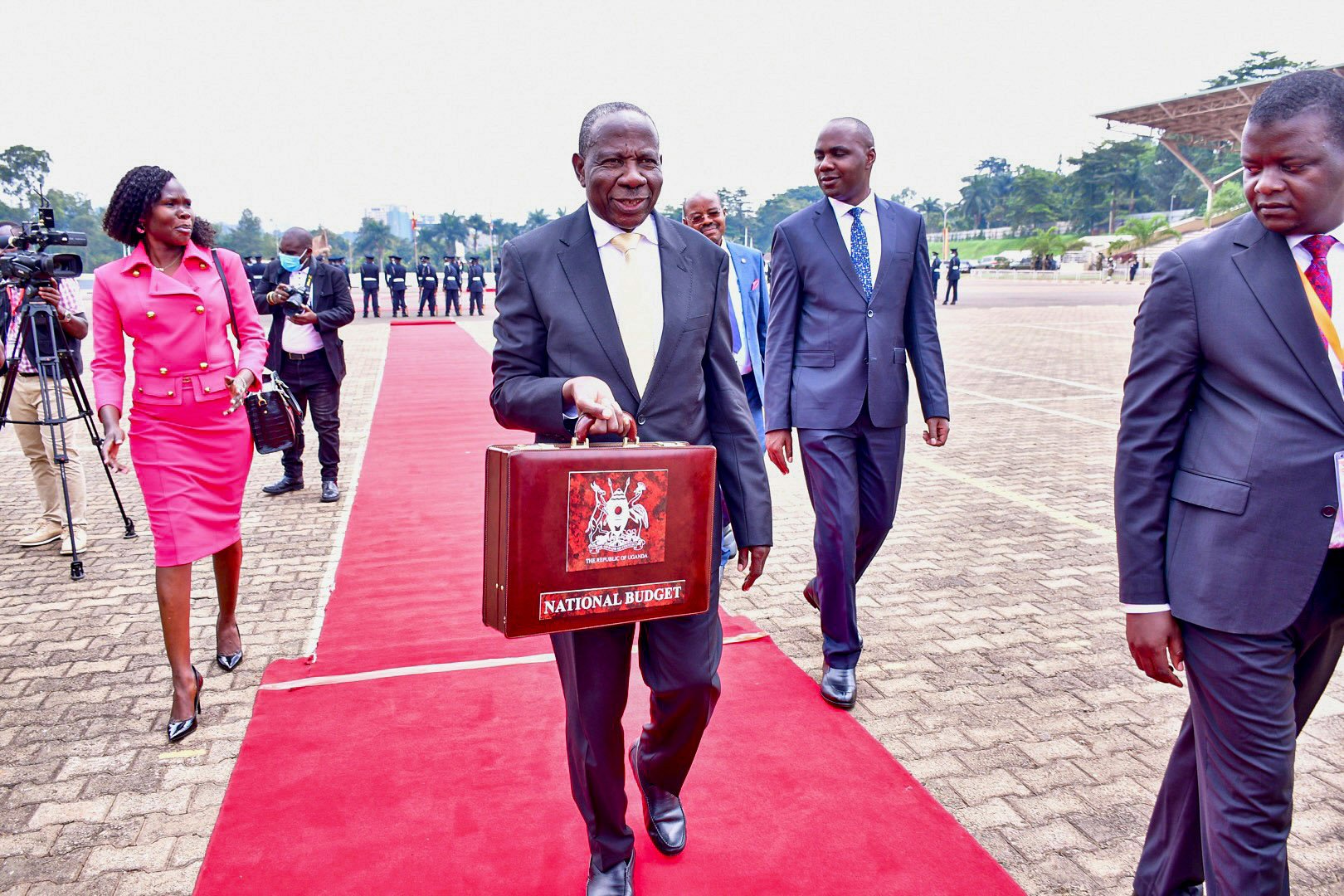Prime
A debt-heavy budget promising riches for all

Finance Minister Matia Kasaija and colleagues arrive for the 2023/2024 National Budget reading at the Kololo Ceremonial Grounds in Kampala on June 15, 2023. PHOTOS/DAVID LUBOWA
What you need to know:
- Instead, the minister said, the new budget focuses on improving household incomes through the Shs1 trillion Parish Development Model (PDM), a programme the government launched in February 2022 to orbit 39 percent of Ugandan households who are peasants into the money economy.
- The new austerity measures include a freeze on creation of new administrative units and domestic borrowing by government and implementing the long-delayed rationalisation of agencies to save the government Shs1 trillion annually.
The Shs52.7 trillion 2023/2024 Financial Year budget that Finance minister Matia Kasaija yesterday dedicated to hard working poor Ugandans remained silent on the pressing household concern: high cost of living.
Instead, the minister said, the new budget focuses on improving household incomes through the Shs1 trillion Parish Development Model (PDM), a programme the government launched in February 2022 to orbit 39 percent of Ugandan households who are peasants into the money economy.
Other priority plans in the revenue and expenditure estimates are reducing government spend and taming borrowing, which by end of this financial year, on June 30, is projected to gross Shs88.9 trillion.
Minister Kasaija said the government will over the next twelve months, starting July 1, accelerate agriculture commercialisation to boost production and productivity and invest to skill up Ugandans under a budget heavy with human capital development promise.
He unveiled blueprints to support private sector growth, improve infrastructure and expedite works in oil and gas sector ahead of the 2025 production target date.

Members of Parliament follow the proceeding as the 2023/2024 National Budget was being presented.
Parliament passed the 2023/24 budget titled, Full monetisation of Uganda’s economy through commercial agriculture, industrialisation, expanding and broadening services, digital transformation and market access, on May 18.
In it, the Shs1 trillion allocation in the ending financial year for PDM, the government’s flagship poverty alleviation, has been maintained despite related corrupt practices that President Museveni and lawmakers have uncovered.
“PDM will boost household incomes as well as the development of micro-enterprises. Since the launch of the PDM … a total Shs590.2 billion has been disbursed to all the 10,459 parishes nationwide, translating into Shs50 million per parish,” minister Kasaija said while reading the budget yesterday.
Relatedly, Shs100 billion has been allocated to the Emyooga initiative, which Mr Kasaija said has created close to 380,000 jobs, while Shs 60 billion has been allocated for skilling the youth.
“This budget is dedicated to those Ugandans who are currently not in the money economy. To those individuals and households whose income per year is below Shs20 million, they have now the opportunity to utilise the support that the National Resistance Movement (NRM) government has provided under PDM, Emyooga and other government initiatives,” he added.
Mr Kasaija sounded buoyant, declaring that the economy has remained resilient and is on course to grow at 6 percent in the new financial year, but offered no relief to families battered by high prices of groceries and other commodities.
The government has consistently rejected subsidy and tax cuts proposal, including by the Opposition and other economists, arguing that they would boomerang in the wake of imported inflation.
Mr Ramathan Ggoobi, the Finance ministry permanent secretary/secretary to the Treasury, said the rate at which prices have been rising is cooling, suggesting an equilibrium of the market forces of supply and demand will stabilise prices by year-end.
“The cost of living has been high mainly because of the global situation,” he said, “We have the right fiscal [and] monetary polic[ies] to ensure prices go down”.
He added: “But for prices to go down takes time. When you employ the right policy mix, like you coordinate government expenditure with the central bank monetary policy, you usually have a downward trend.”
Inflation is officially at 6.3 percent, a fall from the double digits of last year, and Bank of Uganda has maintained the Central Bank Rate, the interest the financial sector regulator charges commercial banks, at 10 percent.

Vice President Jessica Alupo inspects the guard of honour on June 15, 2023.
PS Ggoobi, a former Makerere University Business School lecturer famed for popularising “an economics that works” mantra when still a scholar, has as today’s top Finance technocrat, is struggling to stabilise an economy boat burdened by more than Shs80 trillion debt and revenue shortfalls.
President Museveni, who addressed Parliament at the budget reading virtually from State Lodge Nakasero in Kampala, said Shs17 trillion will in the new financial year be used to service debt, and chided Uganda Revenue Authority (URA) for being unserious.
“Those URA people are also under-collecting [taxes] … they are not doing a good job,” he said.
Back at Kololo Ceremonial Grounds, the venue of the in-person event, PS Ggoobi told this newspaper that reducing inflation “does not necessarily mean that prices are going to reduce”.
“It means that the speed at which prices have been rising is going to reduce. They will still be rising, but at a slower pace,” he argued.




